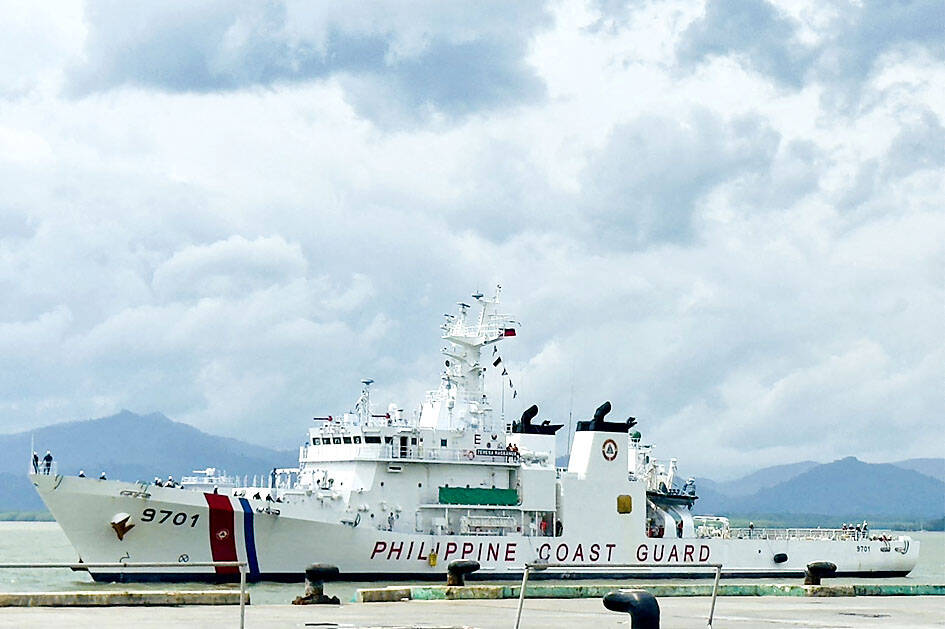The Philippines withdrew its coast guard vessel from a South China Sea shoal that has recently been at the center of tensions with Beijing.
BRP Teresa Magbanua “was compelled to return to port” from Sabina Shoal (Xianbin Shoal, 仙濱暗沙) due to bad weather, depleted supplies and the need to evacuate personnel requiring medical care, the Philippine Coast Guard (PCG) spokesman Jay Tarriela said yesterday in a post on X.
The Philippine vessel “will be in tiptop shape to resume her mission” after it has been resupplied and repaired, Philippine Executive Secretary Lucas Bersamin, who heads the nation’s maritime council, said in a statement earlier yesterday.

Photo: the Philippine Coast Guard via AFP
The ship’s pullout could work in Beijing’s favor. China has repeatedly called for the immediate withdrawal of Philippines vessels from the disputed shoal, including during a diplomatic meeting last week.
China claims almost the entire South China Sea, a key trade route with huge energy potential.
Sabina Shoal has recently emerged as a hot spot in the maritime dispute between China and the Philippines, a key US ally. Beijing and Manila have traded accusations of intent to establish a permanent presence at the coral atoll.
China Coast Guard spokesman Liu Dejun (劉德軍) in a statement on social media said that the Chinese maritime police would continue to carry out law enforcement activities in the waters under China’s jurisdiction, in accordance with the law, and would resolutely safeguard the nation’s territorial sovereignty and maritime rights and interests.
Local media in the Philippines shared photos on social media showing PCG personnel leaving the ship on stretchers, reportedly due to dehydration after five months at sea.
In 2012, Philippine vessels pulled out from Scarborough Shoal (Huangyan Island, 黃岩島), another South China Sea flashpoint also claimed by China and Taiwan, after a standoff with China. Beijing has since exercised effective control of the chain of reefs and rocks, with its ships guarding the area.

SEPARATE: The MAC rebutted Beijing’s claim that Taiwan is China’s province, asserting that UN Resolution 2758 neither mentions Taiwan nor grants the PRC authority over it The “status quo” of democratic Taiwan and autocratic China not belonging to each other has long been recognized by the international community, the Mainland Affairs Council (MAC) said yesterday in its rebuttal of Beijing’s claim that Taiwan can only be represented in the UN as “Taiwan, Province of China.” Chinese Minister of Foreign Affairs Wang Yi (王毅) yesterday at a news conference of the third session at the 14th National People’s Congress said that Taiwan can only be referred to as “Taiwan, Province of China” at the UN. Taiwan is an inseparable part of Chinese territory, which is not only history but

NATIONAL SECURITY: The Chinese influencer shared multiple videos on social media in which she claimed Taiwan is a part of China and supported its annexation Freedom of speech does not allow comments by Chinese residents in Taiwan that compromise national security or social stability, the nation’s top officials said yesterday, after the National Immigration Agency (NIA) revoked the residency permit of a Chinese influencer who published videos advocating China annexing Taiwan by force. Taiwan welcomes all foreigners to settle here and make families so long as they “love the land and people of Taiwan,” Premier Cho Jung-tai (卓榮泰) told lawmakers during a plenary session at the Legislative Yuan in Taipei. The public power of the government must be asserted when necessary and the Ministry of

CROSSED A LINE: While entertainers working in China have made pro-China statements before, this time it seriously affected the nation’s security and interests, a source said The Mainland Affairs Council (MAC) late on Saturday night condemned the comments of Taiwanese entertainers who reposted Chinese statements denigrating Taiwan’s sovereignty. The nation’s cross-strait affairs authority issued the statement after several Taiwanese entertainers, including Patty Hou (侯佩岑), Ouyang Nana (歐陽娜娜) and Michelle Chen (陳妍希), on Friday and Saturday shared on their respective Sina Weibo (微博) accounts a post by state broadcaster China Central Television. The post showed an image of a map of Taiwan along with the five stars of the Chinese flag, and the message: “Taiwan is never a country. It never was and never will be.” The post followed remarks

Proposed amendments would forbid the use of all personal electronic devices during school hours in high schools and below, starting from the next school year in August, the Ministry of Education said on Monday. The Regulations on the Use of Mobile Devices at Educational Facilities up to High Schools (高級中等以下學校校園行動載具使用原則) state that mobile devices — defined as mobile phones, laptops, tablets, smartwatches or other wearables — should be turned off at school. The changes would stipulate that use of such devices during class is forbidden, and the devices should be handed to a teacher or the school for safekeeping. The amendments also say